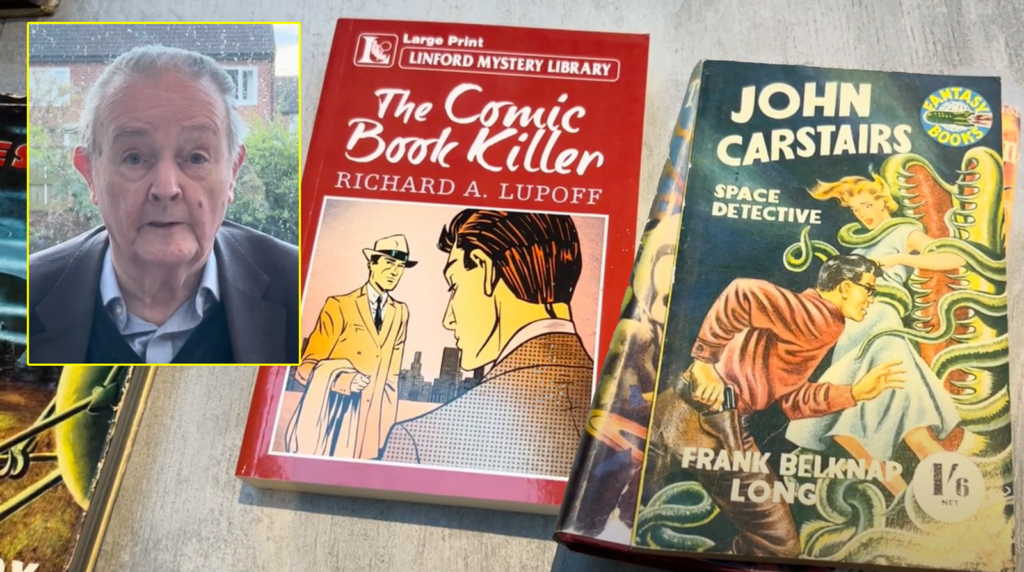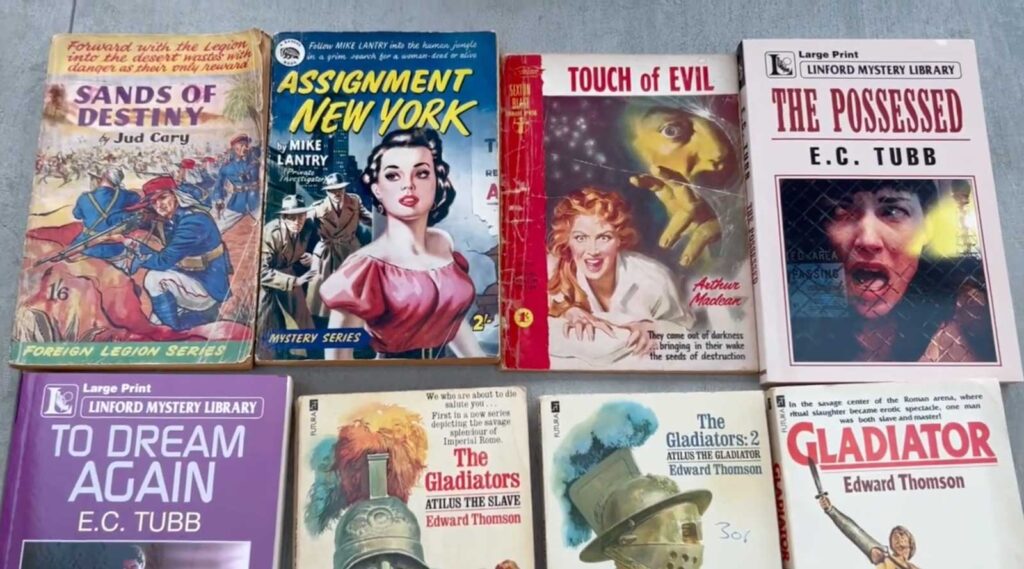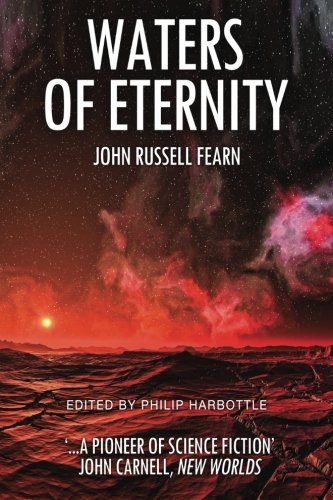
Philip Harbottle, one of the most knowledgeable authors I know when it comes to SF publishing here in the UK, previously delighted us with his enjoyable videocasts charting the ups and downs of 1950s British Science Fiction publishing. More recently, he’s diverged into documenting the work of SF writers such as John Russell Fearn in other genres – specifically, detective fiction.
“In my previous videos, I set out to cover the history of British publishers of science fiction during the post war decade, the “mushroom” period, and the writers who rose to prominence during it. This was the period I myself grew up in, and discovered science fiction.
“As I said in my very first video, in 1954 I set myself the target of discovering exactly how the chaotic and mysterious situation in the UK of good science fiction being published alongside bad science fiction — often under the same author byline — had arisen, and why. In this endeavour, I was pretty much a pioneer and working single-handed, and it took me several decades. My findings have been published in several books and magazine articles over the years, culminating in my long series of videos, which set out all the true facts. I also have some new books and articles in development which will form a capstone to my researches.”
His “mission accomplished”, to all intents and purposes, what next?

“Recently, I fell to musing on the interesting fact that many science fiction writers I’ve collected also wrote extensively in other genres, such as westerns and, more notably perhaps, in mystery and detective fiction, often under pseudonyms. In point of fact, the appeal of science fiction is that it has absorbed many of the tropes of detective and other genre fiction. Many of the earliest science fiction stories featured scientists as detectives, such as Arthur B. Reeves’ famous “Craig Kennedy” stories, which ran for more than 20 years, beginning in 1910. Kennedy spawned many imitators.”
Phil isn’t surprised science fiction writers should have also been very successful writers of detective fiction. “The two genres are highly compatible with each other,” he notes in the first episode charting “Detective Fiction written by Science Fiction writers“.
But will followers of Phil’s science fiction videos be interested in learning about detective fiction or westerns written by British science fiction writers?
There’s only one way to find out…
Philip previously delivered over 60 fascinating videos charting many aspects of British SF fiction down the years, also offering his observations on comics writing, publishing and more. The series has been thoroughly enjoyable, and I’ve enjoyed the journey, so delighted to see it continuing into new pastures.
In Episode 69, “Detective Fiction by Science Fiction Writers“, Phil introduces his new series with a look back at some of the authors he’s covered previously, his own connections with many of them, and his work as an editor…
In Episode 70, “E.C. Tubb’s Detective Fiction“, Phil focuses on the legendary author whose name should be instantly recognised by readers of science fiction, but whose novels in other genres are not nearly so well known, chiefly because they were first published under pseudonyms. This non-sf output comprised one historical Foreign Legion novel, eleven westerns (already discussed in Episode 30, “Tubb’s Hidden Gem“), the ‘Atilus the Gladiator’ Ancient Rome trilogy, and three detective novels.
“Some viewers might be surprised that Tubb published three detective novels – and after reading them may be surprised that he did not publish many more! However, he has published numerous short stories with a strong detectivefiction element—but always within the framework of science fiction. Additionally, many of his ‘Dumarest’ sf novels have strong detective elements, but it is in his shorter sf stories that he comes closest to simon-pure detective fiction, in such stories as “Nonentity” (Authentic, 1955) and “Reluctant Farmer,”(Nebula, 1956).”
Phil resalls some fascinating conversations with Tubb in this video, and reveals how he’s brought many of his stories back into print over the past two decades…
Three episodes devoted to charting John Russell Fearn‘s detective fiction work follow, the first revealing how he utilised several pseudonyms in his career as a writer to secure more work, and experimented in writing detective fiction, that road never proving easy as tastes changed. As the market changed, he honed his craft, and his stories gained a strong following…
Episode 72 addresses Fearn’s work in the 1940s, writing a separate series of detective novels for a Hutchinson imprint, Stanley Paul, under yet another pseudonym – “Hugo Blayn”, the first, Except for One Thing, published in 1947. “A classic of inverted crime fiction, this novel has been widely acknowledged as the precursor of Colombo” Phil notes. “A best seller in its day, copies can still be found on line.”
This episode notes how, through a series of changes at his publishers, Fearn would come to have the opportunity to write science fiction, western, detective, or romantic fiction stories. “Such was his astonishing versatility that Fearn agreed to write in all four genres!” Phil reveals – and also notes just how rare some copies of those works are today…
Episode 73, “Fearn’s Star Weekly Detective Fiction“, Phil charts how Fearn began to write for Star Weekly, a period when he was at the hight of his creative powers, and reveals how marriage reshaped his writing career. It’s a fascinating account of a very different age in publishing, brought to life today thanks to Phil’s efforts to get Fearn’s work back into print.
This catch up on Phil’s wonderful videos culminates with Episode 74, “John Russell Fearn’s Aladdin’s Cave” treating us to sight of some more rare first editions of these sought after detective works, and, more importantly, how a sad newspaper discovery led to rescuing much of Fearn’s unpublished work from being consigned to the Blackpool council dump. Thanks to Phil’s and others hard work, he was able to see many stories published – and will soon be revealing the fate of Fearn’s unpublished works, too…
Philip Harbottle is one of the most knowledgeable authors I know when it comes to SF publishing here in the UK, and I would urge you to check out and subscribe to 1950s British Science Fiction YouTube Channel here.
A life-long science fiction fan, he is regarded as a world authority on the works of John Russell Fearn, whose credits encompass writing “Garth” for the Daily Mirror, and the “Golden Amazon” for Spaceship Away (adapting Fearn’s stories).
He’s also very kindly contributed a number of synopses of early “Garth” stories to downthetubes, which we are adding as time permits.
Web Links
• Subscribe to 1950s British Science Fiction YouTube Channel here
• Vultures of the Void: The Legacy by Philip Harbottle (AmazonUK Affiliate Link)
Philip Harbottle presents a fascinating guide to British science fiction publishing history
• Buy Across the Ages by John Russell Fearn, adapted into comics by Philip Harbottle here from Lulu
A vintage comic strip by Philip Harbottle, adapting John Russell Fearn’s much admired SF novel Across the Ages, has finally been published – some sixty years after the now renowned author and publisher drew it (Read our news item about this here)
• Books edited or published by Phil Harbottle on AmazonUK (Affiliate Link)
• Rayguns and Rocketships by Rian Hughes, featuring many of the covers in Philip’s videocasts, is available to order now direct from Korero Press | Order it from AmazonUK (Affiliate Link) | ISBN: 978-1912740048
• Subscribe to 1950s British Science Fiction YouTube Channel
The founder of downthetubes, which he established in 1998. John works as a comics and magazine editor, writer, and on promotional work for the Lakes International Comic Art Festival. He is currently editor of Star Trek Explorer, published by Titan – his third tour of duty on the title originally titled Star Trek Magazine.
Working in British comics publishing since the 1980s, his credits include editor of titles such as Doctor Who Magazine, Babylon 5 Magazine, and more. He also edited the comics anthology STRIP Magazine and edited several audio comics for ROK Comics. He has also edited several comic collections, including volumes of “Charley’s War” and “Dan Dare”.
He’s the writer of “Pilgrim: Secrets and Lies” for B7 Comics; “Crucible”, a creator-owned project with 2000AD artist Smuzz; and “Death Duty” and “Skow Dogs” with Dave Hailwood.
Categories: Books, Features, Magazines, Merchandise, Other Worlds

Not in the UK, and not exactly “SF authors writing detective fiction”, but both Isaac Asimov and Larry Niven wrote a few detective/SF crossovers such as “The Naked Sun” and “The long ARM of Gil Hamilton”. Just thought I’d pop that in there, as I’m a fan of both genres!
Yes, Philip mentions these in the first episode included above, if memory serves. There’s “Caves of Steel” by Asimov, too.